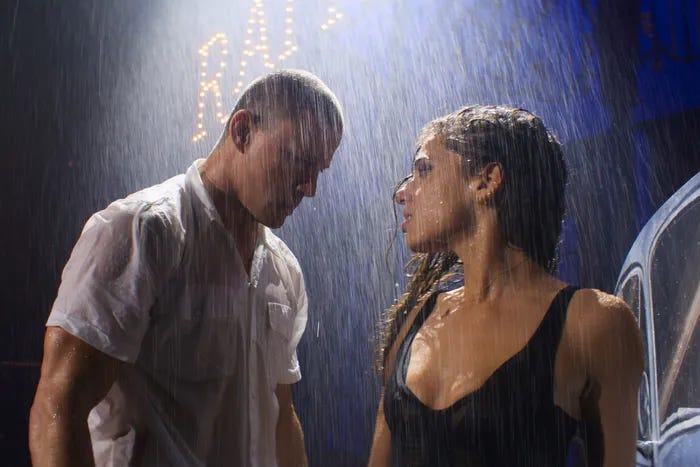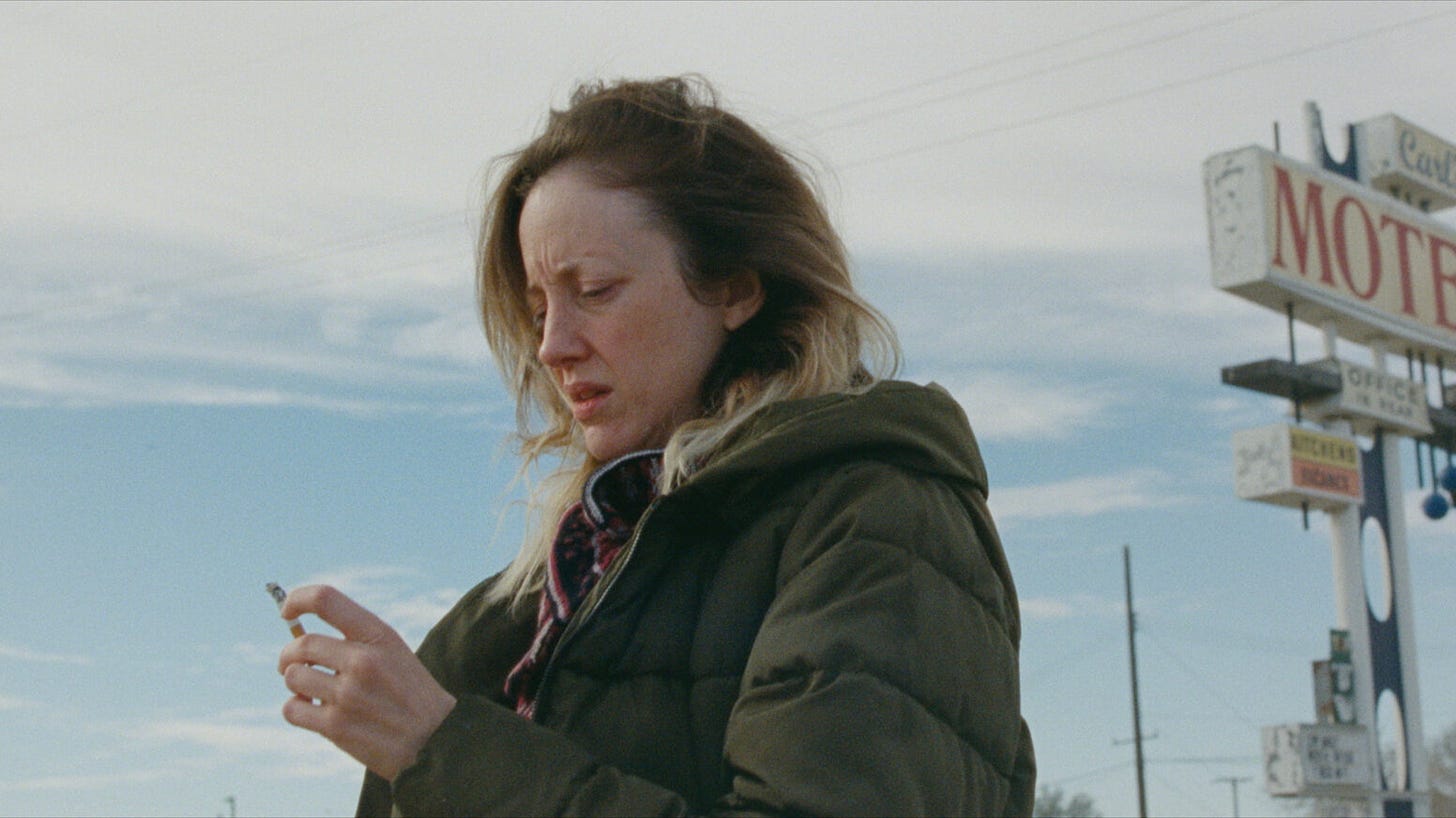In Review: 'Magic Mike's Last Dance,' 'To Leslie'
Steven Soderbergh and Channing Tatum head to London for perhaps one dance too many and the year's biggest Oscar controversy surrounds a run-of-the-mill indie.
Magic Mike’s Last Dance
Dir. Steven Soderbergh
112 min.
Before getting into Magic Mike’s Last Dance, the third and reportedly final film in the Magic Mike series, it’s worth taking a moment to appreciate the accomplishments of its predecessors. Both 2012’s Magic Mike (directed, like this film, by Steven Soderbergh and written, like all three, by Reid Carolin) and 2015’s Magic Mike XXL (directed by Gregory Jacobs) depcited the world of male stripping with unexpected respect, even tenderness. The film’s dance routines played like a mix between art and therapy sessions. The films treated stripping as legitimate a form of expression as any style of dance, and one that happened to give the screaming fans in the audience an outlet for unexpressed desires.
The finale of Magic Mike XXL, a joyous string of routines that essentially does for male stripping what Stop Making Sense did for funk and Afrobeat-influenced art rock, played like the exclamation point at the end of a two-film cycle. It might have been best to let that punctuation stand. In isolation, the dance scenes in Magic Mike’s Last Dance do the same, particularly the two bookending the film. It’s everything in between that’s a little iffy.
As the film opens, now-fortysomething hero Mike Lane (Channing Tatum, who drew from his own experience as a Florida dancer for the first film) is picking up the pieces after the pandemic sent his furniture business into the toilet. After his past line of work is outed while working as a bartender for a charity function at a lavish private residence in Miami, Mike agrees to do one last private dance for the event’s organizer, Maxandra (Salma Hayek Pinault). But, it soon becomes apparent, this is less because Mike needs the money than because he sees Max needs the dance, staged as an erotic and athletic duet that ends in the bedroom.
The next morning, Max has a proposal: come with her to London and she’ll give him an artistically fulfilling job. Lacking other options, and smitten with a patron who now wants to keep things strictly business, he follows her overseas, where he discovers Max would like him to revamp Isabel Ascendant, a stodgy but popular play about a woman who has to choose between love and money (foreshadowing!), into a male stripping extravaganza as an act of revenge against the billionaire husband she’s in the process of divorcing.
This turns out to be a weak foundation for the film, which only really comes to life when the dancing starts. Business involving Mike’s awkward relationships with Max’s butler/right-hand-man Victor (Ayub Khan Din) and her daughter Zadie (Jemelia George, who also narrates) don’t really go anywhere and, worse yet, the powerful chemistry generated by Tatum and Hayek Pinault in the film’s opening scene largely evaporates after they touch ground in the U.K.
As a love story, it’s bafflingly thin. As a comedy, it’s never particularly funny. And just as an act of storytelling, it’s all pretty half-assed, as if everyone involved knew they were just padding the space between dance scenes (a problem absent from Last Dance’s predecessors). But, oh, that dancing. From a clever routine on a London bus to the balletic rain-soaked finale, Magic Mike’s Last Dance is filled with creative, sexy choreography performed by a talented array of dancers (though not by the supporting cast of the previous films, who are limited to a Zoom cameo). If only it played more like a proper conclusion than an extended coda. —Keith Phipps
Magic Mike’s Last Dance opens this weekend in theaters everywhere.
To Leslie
Dir. Michael Morris
119 min.
Until To Leslie got embroiled in a controversy over Andrea Riseborough’s surprise nomination for the Best Actress Oscar, it received virtually no attention at all, despite kind reviews out of its SXSW debut and a theatrical run back in October. I confess to not having heard of it at all until a series of coordinated celebrity tweets started rolling out about it, which I might roughly paraphrase as: “Raymond Shaw is the kindest, bravest, warmest, most wonderful human being I’ve ever known in my life.” Depending on your perspective, the campaign for Riseborough was either a grassroots push for a film without the resources to reach the Academy members or a risible piece of celebrity influence-peddling. That’s not a debate I care to wade into today, except to confess that this film would not have come to my attention otherwise.
So has this awards-season dust-up resulted in an unearthed gem? Alas, no, though it’s lamentable that an indie drama of such modesty and integrity—to say nothing of a stacked cast—can zip through theaters and disappear as if it never existed at all. Then again, the problem with To Leslie is that it’s too much of a down-the-middle indie to make much of an impression, telling a story of addiction and redemption that never once seems surprising. Some of that may be about the nature of addiction itself, which can reduce people to narrow patterns of behavior, alternating between feeding their addiction and dealing with its fallout. But whenever the film devises ways to break out of that pattern, it shifts from familiar to contrived.
Leading a cast of conspicuous (if mostly persuasive) non-Texans, Riseborough locks into the role of Leslie, an alcoholic from West Texas who once won $190,000 in the lottery but lost most of it to the bottle. The film begins with her clinging to the bottom rung six years later, having exhausted the patience of friends and family members who have bailed her out for the last time. Or almost the last time, anyway. When she’s evicted from her apartment, she buses out to crash with her estranged son James (Owen Teague), who agrees to take her in under the condition that she not drink.But it only takes a few minutes on her own for Leslie to root through his things for cash. Soon enough, she’s ping-ponged back to Texas to stay with her friend Nancy (Allison Janney) and Nancy’s boyfriend Dutch (Stephen Root), but she’s out after one strike there, too.
Now homeless in her hometown, Leslie gets an unexpected lifeline from Sweeney (Marc Maron), a motel proprietor who’s new enough to town not to have been alienated by her. Sweeney offers a room and small hourly wage to clean rooms, but even that act of charity proves difficult for Leslie to accept. One of the film’s finer qualities is how it rarely softens her desperation and hostility or makes the other characters seem cruel for repeatedly casting her out. Riseborough pulls off the neat trick of making Leslie seem feral yet vulnerable at the same time, like a stray cat rooting for scraps in an alleyway. Leslie doesn’t even have the benefit of anonymity, either: Everyone knows she’s the drunk who squandered lottery riches.
To Leslie is the sort of scrappy affair that gets described as “lived-in,” but the film’s most naturalistic performance is not from Riseborough but Maron, whose Texas accent may waver but whose low-key sincerity is a subtle and necessary counterweight to Riseborough’s nervier turn. Sweeney sees something in Leslie, but he’s also a bit of a pushover and indulges her more than most reasonable people would do, which can only be a surprise to someone who’s alienated every last person who ever cared about her. To Leslie flickers to life on their chemistry, but it also angles that much more toward conventionality, giving way to an ending that’s fully a fantasy. No one wins the lottery twice, after all. — Scott Tobias
To Leslie is available for rental on all the usual platforms.









"I confess to not having heard of it at all until a series of coordinated celebrity tweets started rolling out about it, which I might roughly paraphrase as: “Raymond Shaw is the kindest, bravest, warmest, most wonderful human being I’ve ever known in my life."
Love the Manchurian Candidate reference. #ManCan
It's hard not to like To Leslie -- Riseborough's performance really is one for the ages. I actually found Maron to be the weakest link in the film; I had a hard time tuning into him in contrast to Riseborough (and Teague, too -- I really hope he'll keep finding more stuff to do because I loved him in Mrs. Fletcher and loved him here). To date, Maron's best for me is in Sword of Trust, and a lot of that is attributable to the great (and sadly late) Lynn Shelton.
Addendum: Maron was pretty great in GLOW, too!